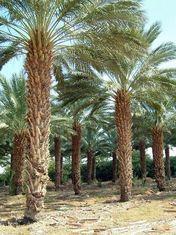
Long gone are the days when consumers only bought dates as their annual Christmas treat, and the ubiquitous packs of Eat Me were proudly stacked on supermarket shelves as the sole option for shoppers.
Israel is a major supplier of dates, and is sending increasingly large volumes to the UK as the product moves out of its traditional Christmas market window and claims its rightful place as a year-round treat in the exotics category. The country exports 9,000 tonnes of dates to the EU annually, with 2,000t of those heading for UK shores. Exporter Agrexco handles around 50 per cent of that volume.
“Israel grows the full range of date varieties, including Medjoul, Bahri, Deklet Nour, Dahri, Halawi and Chinawi,” Agrexco UK general manager Oded Yacovson tells FPJ.
“We start harvesting Bahri in mid-July and Medjoul in mid-August. Bahri is a yellow date that is very popular with the ethnic market, especially during Ramadan. However, Bahri only has a three- to four-week shelf life, and each year Ramadan is earlier and earlier. This year it is on August 31, which is okay, but in the future it may prove to be more difficult to supply during Ramadan. The first vessel of this year’s Bahri crop set sail for the UK this week.”
New, flavoursome varieties such as Medjoul have helped secure a year-round market for dates, and Israel has been at the forefront of this revolution. Over the last 10 years, there has been a significant shift on behalf of Israeli growers towards producing Medjoul in preference to other cultivars, explains Yacovson.
“Medjoul orchards used to be centred in the Jordan Valley and North Galilee, but the Arava region in the far south of Israel is now fast shaping up as the preferred location for production,” he says. “Medjoul from the Arava are better quality - they are juicier and have better skin separation, because the climate is drier and more suited to date growing. In the last two years, lots of Agrexco growers have come to us and asked if they can produce dates, and they have started planting Medjoul in the Arava. We are selling good volumes.”
Israel grew 5,000t of Medjoul in 2002, but that figure now stands at 10,000-11,000t. By 2012, production is expected to hit the 20,000t mark. “Agrexco is preparing for this figure,” says Yacovson. “We are selling dates to Europe and the UK, Russia and the US.”
Israel’s main competition on Medjoul dates comes from the US, South Africa and Mexico - but 50 per cent of global volumes come from Israel, maintains Yacovson.
Agrexco has made some changes to its supply chain for dates, enabling it to further increase the interest of UK retailers. “We inspect the fruit, then store it at low temperatures, so it keeps for a long time. For the last two years we have brought the fruit into the UK in this way, and we store it here until it is ready to be sold,” says Yacovson.
This season, all the Medjoul that Agrexco supplies to the UK will arrive having been held at these low temperatures. “We have the best cool chain and the best growers in the Arava,” says Yacovson. “We supply UK multiples, wholesalers and foodservice firms, and have a lot of packaging options for that - 150g, 200g, up to 5kg packs, etc. We are very flexible and do tailor-made packs.” Agrexco also sells organic Medjoul dates to the UK multiples, as well as pitted Medjoul stuffed with nuts.
So why are dates becoming more popular in the UK? According to Yacovson, it is a combination of their taste, and the fact they are becoming more widely available. “By 2012, larger volumes will mean the product should become more reasonably priced for all consumers, and our aim is to make it a mainstream fruit. I would like people to remember Medjoul as their favourite date, like adults now remember Eat Me dates from their childhood.”
The UK’s growing ethnic population is helping increase sales of dates, but Agrexco is keen to push the product all year round, rather than just at the traditional sales peaks of Christmas and Ramadan. “Sales go up then, but the idea is not to restrict it to the festivals,” says Yacovson. “We are trying to find more niche markets than the multiples for Medjoul, such as coffee and snack shops, service stations, etc. Even the young ethnic population today wants to eat fast food rather than the traditional food of their culture. We would like to change the attitude of the market from always buying chocolate as a snack to start buying Medjoul dates.
“I am a strong believer that this is the future for dates - we need to market them on the shelf like nature’s sweets.”
But despite booming demand for their products, date growers in Israel are not without their problems. “Date growers face the same issues as any others,” says Yacovson. “There is a terrible water shortage in Israel - the Sea of Galilee, which is one of the main sources of water, is shrinking. There is also a labour shortage, and the exchange rate between the shekel and the pound over the last six months is pushing down returns. On all Agrexco lines we are struggling to meet the needs of both the grower and the multiples. Medjoul is an exclusive item - it costs a fortune to pick and process, and we need to take that into account for the growers.”



